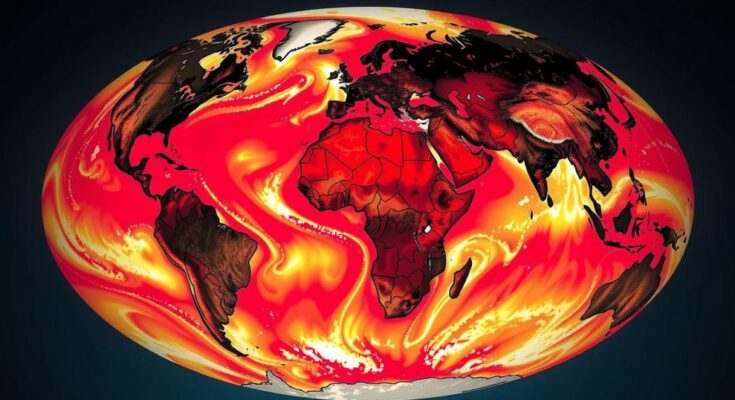In 2024, Earth recorded its hottest year, surpassing the 1.5 degrees Celsius threshold set by the Paris Agreement. The increase in average global temperature has raised concerns among scientists over the catastrophic consequences that could result if this warming persists. This alarming trend is evidenced by an alarming number of billion-dollar weather disasters reported in the U.S. last year. Immediate action is deemed necessary to mitigate the impending risks associated with ongoing climate change.
In 2024, Earth has recorded its hottest year ever, exceeding significant warming thresholds, as declared by several weather monitoring agencies. The global average temperature surpassed the 1.5 degrees Celsius limit set by the Paris Agreement for the entire year. Climate scientists warn that persistent warming above this threshold will lead to catastrophic consequences, including increased mortality, severe weather events, and environmental degradation. Initial findings indicate 2024’s temperature increased significantly compared to previous years, driven by greenhouse gas emissions from fossil fuel combustion. The ramifications of this heat are already evident, as seen in the 27 billion-dollar weather disasters reported in the United States last year.
As 2025 begins, catastrophic events continue, with severe wildfires impacting Southern California. Various meteorological organizations reported differing warming figures, with the Copernicus Climate Service recording an increase of 1.6 degrees Celsius, while U.S. agencies registered lower figures. Scientists attribute these record temperatures to the buildup of greenhouse gases, exacerbated by natural phenomena such as the El Niño effect, which contributed additional heat to this year’s outcomes.
The recent record-breaking temperatures highlight the urgent climate crisis facing the planet. The 1.5 degrees Celsius threshold, established within the framework of the Paris Agreement, is viewed as a critical limit beyond which the effects of climate change could escalate exponentially. Historical data indicates a clear trend towards increasing average temperatures due to human activity, particularly from fossil fuel usage. The ongoing warming trend presents heightened risks of extreme weather, loss of biodiversity, and rising sea levels, which have been documented in recent climate reports. The frequency of billion-dollar disasters in the U.S. underscores the immediate impacts of climate change as the scientific community calls for urgent action.
The continuous rise in global temperatures exemplifies an alarming trend towards exceeding critical climate thresholds, as evidenced by the unprecedented heat experienced in 2024. The significance of maintaining the 1.5 degrees Celsius goal cannot be understated, as its breach signals dire environmental consequences. It is imperative for policymakers and global leaders to recognize the urgency for decisive climate action to avert further degradation of our planet’s ecosystems and mitigate the escalating risks associated with climate change.
Original Source: www.keranews.org




